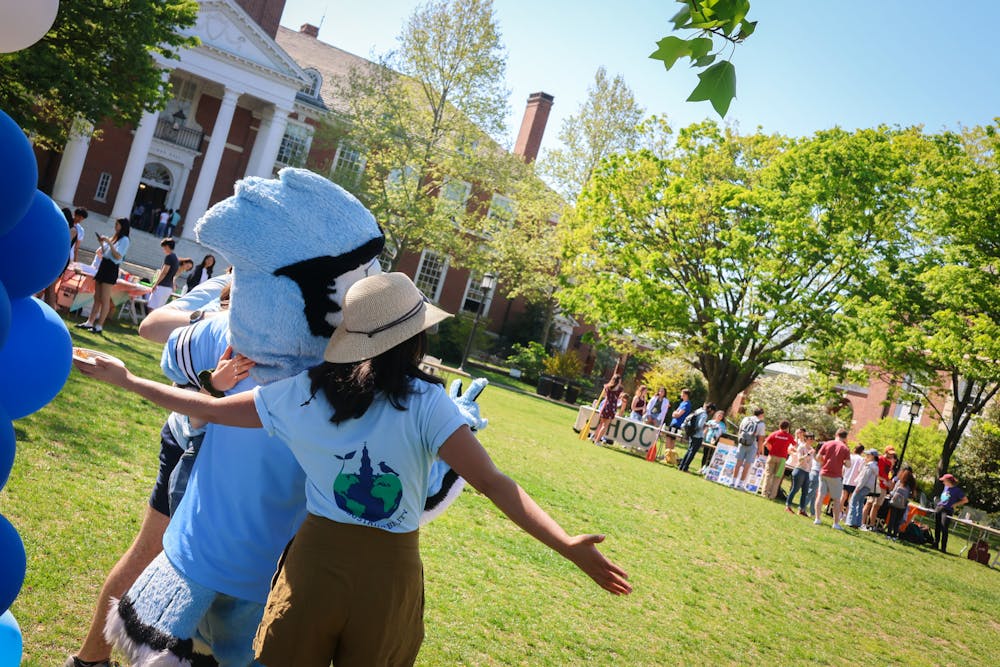Numerous sustainability-related initiatives were seen on campus this week in celebration of Earth Day. Community members shared their views on the University’s efforts to support sustainability and the improvements they would like to see implemented.
The Office of Sustainability publishes an annual report detailing the University’s progress from the year prior. The 2023 report highlighted that Hopkins had reduced 51% of greenhouse gas emissions, meeting a goal outlined in the 2009 Climate Change Implementation Plan three years ahead of schedule.
In an interview with The News-Letter, Peter Winch, co-chair of the Sustainability Leadership Council, described the advancements in communication about environmental issues.
“There is a much stronger social network now among people who are committed to [sustainability] at Hopkins,” he said. ”People who are committed are talking to each other a lot more and in a more constructive and productive way.”
However, Winch stressed that there is also a need to communicate more effectively with people who are less aware of environmental issues.
Sophomore Max Carroll, the project manager of the Sustainable Hopkins Innovative Projects thrift shop, expressed similar concerns about the lack of campus-wide communication about sustainability in an interview with The News-Letter. He noticed that, while he frequently receives news on the environment as part of the Environmental Science program, his peers do not.
“I really wish the school emphasized more sustainability-related news,” he said. “Granted, it's hard because there isn't a student-wide platform to communicate outside of email, but I wish the school would dedicate a little more communication towards it.”
Carroll added that the school could also improve its recycling system. There are small guides attached to trash bins that inform students how to distinguish between incinerate, compost, recycling and paper. However, he noted that many students are still confused about the difference between them.
He suggested an educational activity during orientation week as a potential solution to such problems.
In an interview with The News-Letter, sophomore Christina Fahmy, officer of the Students for Environmental Action, asserted that the University could improve its waste reduction.
“Especially as a research institute and as a university, [producing waste] is hard to avoid,” she said. “But I think there are avoidable wastes that we can move to change, or at least to try to reduce our impact, such as with the dining halls.”
Fahmy noted that compost, the material for to-go boxes at dining halls, is still not a perfect option despite being better than plastic. Instead, she conveyed that the best option to reduce waste would be to encourage students to eat in the dining hall, where they would be using reusable silverware and dishware.
Similarly, Winch called attention to using more reusable materials to reduce waste. In addition to collective efforts as a University, he urged individuals to take actions, such as using tumblers instead of plastic water bottles or disposable coffee cups.
Nevertheless, some community members praised the University for its progress in advocating for sustainability.
Susanna Thon, an associate professor in the Department of Electrical and Computer Engineering and member of Ralph O’Connor Sustainable Energy Institute (ROSEI) leadership council, viewed the University’s efforts optimistically in an interview with The News-Letter.
“You can always do more, so I'm not going to say that our work is done here,” she said. “But I think we're making a good start, and Hopkins has shown serious interest in this issue by doing things like helping us to form ROSEI and providing the resources that we need.”
In an interview with The News-Letter, Teressa Healy, communications and engagement specialist in the Office of Sustainability, stated that the office is currently in the process of developing a new Sustainability Plan.
“We had over 1,000 community members provide input through a survey, a series of 11 virtual workshops last spring and a town hall to describe what they would like to see in the Plan,” she said. “We took that feedback last summer and determined a series of goals and actions to achieve the progress that people wanted to see.”
A draft of the new Sustainability Plan will be released in the fall for another round of public input. Based on the feedback, the Office of Sustainability plans to make revisions before its formal announcement.
Leana Houser, waste reduction and recycling manager in the Office of Sustainability, shared her enthusiasm for the implementation of the new Sustainability Plan in an interview with The News-Letter.
“I think [the Plan] is going to start normalizing sustainability in everyone's work. It will be a catalyst for accountability and agency for everyone across the University to do their part,” she said. “In every level and every role, people can find their passion and opportunity to help the University meet its goal.”
Houser, who has worked at Hopkins since 2006, claimed that there has been significant progress in sustainability work in the last 17 years. She remarked that many positions to address sustainability have been created in different divisions — such as Hopkins Dining, the School of Medicine and the School of Public Health. Moreover, Houser pointed at the establishment of the Office of Sustainability in 2006 and the Sustainability Leadership Council in 2019.
“We have done amazing work in making commitments [to sustainability] at a University level,” she said. “When it comes to celebrating Earth Day, our hope is that each area of the University starts to create their own events and celebrate the work that they’re doing in their space.”

















